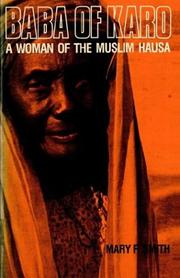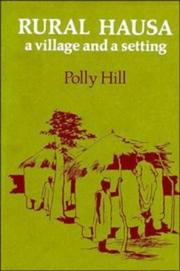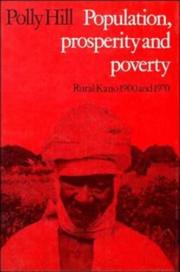| Listing 1 - 10 of 16 | << page >> |
Sort by
|

Abstract | Keywords | Export | Availability | Bookmark
 Loading...
Loading...Choose an application
- Reference Manager
- EndNote
- RefWorks (Direct export to RefWorks)

ISBN: 0521082420 0521126282 0511628188 051182629X Year: 1972 Publisher: Cambridge : Cambridge University Press,
Abstract | Keywords | Export | Availability | Bookmark
 Loading...
Loading...Choose an application
- Reference Manager
- EndNote
- RefWorks (Direct export to RefWorks)
This book was originally published in 1972 and relates to the Hausa-speaking people of West Africa. At the time of publication there were perhaps as many as 15 million Hausa-speaking people in the area, most of whom lived in the countryside in northern Nigeria and the neighbouring Niger Republic. This book is at once an examination of the socio-economic life of a small Hausa village and a study of the way of life of the rural Hausa generally. The book as a whole provides a wide-ranging survey both of what was known and of what was, and in some cases still is, little understood. Very few books had been written on the rural Hausa, much of the literature consisting of scarce pamphlets and official reports; this book not only reports important research, but also surveys literature which was otherwise not generally available. The themes which emerge from this study are similar to many which Polly Hill has stressed elsewhere: people who do not fit into crude stereotypes and socio-economic life are always much more varied and sophisticated than superficial observers would suppose.
Hausa (African people) --- Hausa (Peuple d'Afrique) --- Batagarawa, Nigeria --- Economic conditions --- Social conditions --- Economic conditions. --- Social conditions. --- Hausa (African people). --- Abakwariga (African people) --- Afuno (African people) --- Haoussa (African people) --- Hausaawaa (African people) --- Hausas --- Hausawa (African people) --- Haussa (African people) --- Hawsa (African people) --- Mgbakpa (African people) --- Ethnology --- Social Sciences --- Anthropology
Book
ISBN: 0520025024 Year: 1978 Publisher: Berkeley University of California
Abstract | Keywords | Export | Availability | Bookmark
 Loading...
Loading...Choose an application
- Reference Manager
- EndNote
- RefWorks (Direct export to RefWorks)
Hausa (African people) --- Haoussa (Peuple d'Afrique) --- History --- Histoire --- Daura (Nigeria : Emirate) --- History. --- Abakwariga (African people) --- Afuno (African people) --- Haoussa (African people) --- Hausaawaa (African people) --- Hausas --- Hausawa (African people) --- Haussa (African people) --- Hawsa (African people) --- Mgbakpa (African people) --- Ethnology --- Daura, Nigeria (Emirate)

ISBN: 0521215110 9780521215114 Year: 1977 Publisher: Cambridge Cambridge university press
Abstract | Keywords | Export | Availability | Bookmark
 Loading...
Loading...Choose an application
- Reference Manager
- EndNote
- RefWorks (Direct export to RefWorks)
Hausa (African people) --- Kano State (Nigeria) --- Batagarawa, Nigeria --- Economic conditions. --- Social conditions. --- Hausa (African people). --- Abakwariga (African people) --- Afuno (African people) --- Haoussa (African people) --- Hausaawaa (African people) --- Hausas --- Hausawa (African people) --- Haussa (African people) --- Hawsa (African people) --- Mgbakpa (African people) --- Ethnology --- Kano State of Nigeria
Book
ISBN: 9789004185432 9786612952791 9004185437 128295279X 9781282952799 9789004185425 9004185429 Year: 2010 Publisher: Leiden Brill
Abstract | Keywords | Export | Availability | Bookmark
 Loading...
Loading...Choose an application
- Reference Manager
- EndNote
- RefWorks (Direct export to RefWorks)
Hausa society in West Africa has attracted researchers’ attention for decades, and has featured in the historical record for at least 500 years. Yet, no clear picture is available of the historical trajectories that underpin Hausa ethnogenesis. This book addresses this gap, deploying interdisciplinary approaches to revisit questions to which single disciplines have given partial answers, often due to the paucity of written sources for early periods of Hausa history. Contributors draw from the disciplines of anthropology, linguistics, economic history, and archaeology to enquire into how a ‘Hausa’ identity took shape and what have been its changing material and cultural manifestations. The result is a compelling overview of one of the most iconic groups of modern West Africa.(Provided by publisher)
Hausa (African people) --- Abakwariga (African people) --- Afuno (African people) --- Haoussa (African people) --- Hausaawaa (African people) --- Hausas --- Hausawa (African people) --- Haussa (African people) --- Hawsa (African people) --- Mgbakpa (African people) --- Ethnology --- Ethnic identity. --- #SBIB:39A73 --- Ethnic identity --- Etnografie: Afrika --- Haoussa (Peuple d'Afrique) --- Identité ethnique --- Sociology of minorities --- West Africa
Book
ISBN: 9791092312706 9782015245 Year: 2021 Publisher: Ibadan : IFRA-Nigeria,
Abstract | Keywords | Export | Availability | Bookmark
 Loading...
Loading...Choose an application
- Reference Manager
- EndNote
- RefWorks (Direct export to RefWorks)
undefined
Hausa (African people) --- Igbo (African people) --- Kano (Nigeria) --- Ethnic relations. --- Ibo (African people) --- Ibo tribe --- Ethnology --- Abakwariga (African people) --- Afuno (African people) --- Haoussa (African people) --- Hausaawaa (African people) --- Hausas --- Hausawa (African people) --- Haussa (African people) --- Hawsa (African people) --- Mgbakpa (African people) --- Kano Township (Nigeria) --- ethnic conflict --- Kano --- housa --- Igbo
Book
ISBN: 0900733217 Year: 1981 Publisher: Edinburgh Royal Scottish museum
Abstract | Keywords | Export | Availability | Bookmark
 Loading...
Loading...Choose an application
- Reference Manager
- EndNote
- RefWorks (Direct export to RefWorks)
collecting --- Miller, R.E. --- Nigeria --- Hausa (African people) --- -Abakwariga (African people) --- Afuno (African people) --- Haoussa (African people) --- Hausaawaa (African people) --- Hausas --- Hausawa (African people) --- Haussa (African people) --- Hawsa (African people) --- Mgbakpa (African people) --- Ethnology --- Material culture --- -Exhibitions --- Miller, R. E. --- -Ethnological collections --- Royal Scottish Museum --- -Edinburgh. --- Edinburgh Museum of Science and Art --- National Museum of Antiquities of Scotland --- Royal Museum of Scotland --- Exhibitions --- Exhibitions. --- -Material culture --- Abakwariga (African people) --- Material culture&delete& --- Ethnological collections
Book
ISBN: 3700117612 9783700117612 Year: 1990 Volume: 556 6 Publisher: Wien Österreichische Akademie der Wissenschaften
Abstract | Keywords | Export | Availability | Bookmark
 Loading...
Loading...Choose an application
- Reference Manager
- EndNote
- RefWorks (Direct export to RefWorks)
Hausa (African people) --- Jihad --- Haoussa (Peuple d'Afrique) --- Politics and government --- Politique et gouvernement --- Jihad. --- Politics and government. --- -Jihad --- Holy war (Islam) --- Islamic holy war --- Jahad --- Jehad --- Muslim holy war --- War (Islamic law) --- Abakwariga (African people) --- Afuno (African people) --- Haoussa (African people) --- Hausaawaa (African people) --- Hausas --- Hausawa (African people) --- Haussa (African people) --- Hawsa (African people) --- Mgbakpa (African people) --- Ethnology --- Jihād --- Hausa (African people) - Politics and government.
Book
ISBN: 0816539324 0816527776 9780816539321 Year: 2009 Publisher: University of Arizona Press
Abstract | Keywords | Export | Availability | Bookmark
 Loading...
Loading...Choose an application
- Reference Manager
- EndNote
- RefWorks (Direct export to RefWorks)
This fascinating book examines the biology and culture of foods and beverages that are consumed in communal settings, with special attention to their health implications. Nina Etkin covers a wealth of topics, exploring human evolutionary history, the Slow Food movement, ritual and ceremonial foods, caffeinated beverages, spices, the street foods of Hawaii and northern Nigeria, and even bottled water. Her work is framed by a biocultural perspective that considers both the physiological implications of consumption and the cultural construction and circulation of foods.
Food habits. --- Drinking customs. --- Nutritional anthropology. --- Hausa (African people) --- Abakwariga (African people) --- Afuno (African people) --- Haoussa (African people) --- Hausaawaa (African people) --- Hausas --- Hausawa (African people) --- Haussa (African people) --- Hawsa (African people) --- Mgbakpa (African people) --- Ethnology --- Anthropology --- Nutrition --- Manners and customs --- Eating --- Food customs --- Foodways --- Human beings --- Habit --- Diet --- Oral habits --- Food. --- Social life and customs. --- Food habits --- economic botany --- slow food --- medicinal food --- biocultural --- anthropology --- food culture --- food
Book
ISBN: 9780253023834 9780253023759 9780253023896 0253023890 0253023750 0253023831 Year: 2017 Publisher: Bloomington, Indiana ; Indianapolis, Indiana : Indiana University Press,
Abstract | Keywords | Export | Availability | Bookmark
 Loading...
Loading...Choose an application
- Reference Manager
- EndNote
- RefWorks (Direct export to RefWorks)
As she tells Hadija's story, O'Rourke disrupts dominant patriarchal and colonial narratives that have emphasized male activities and projects to assert cultural distinctiveness, and she brings forward a new set of women's issues involving concerns for personal prosperity, the continuation of generations, and Islamic religious expectations in communities separated by long distances.
Hausa (African people) --- Women, Hausa --- Marriage customs and rites --- Islamic marriage customs and rites --- Marriage customs and rites. --- Social conditions. --- Marriage customs and rites, Islamic --- Muslim marriage customs and rites --- Bridal customs --- Betrothal --- Manners and customs --- Rites and ceremonies --- Weddings --- Hausa women --- Women, Hausa (African people) --- Abakwariga (African people) --- Afuno (African people) --- Haoussa (African people) --- Hausaawaa (African people) --- Hausas --- Hausawa (African people) --- Haussa (African people) --- Hawsa (African people) --- Mgbakpa (African people) --- Ethnology
| Listing 1 - 10 of 16 | << page >> |
Sort by
|

 Search
Search Feedback
Feedback About UniCat
About UniCat  Help
Help News
News